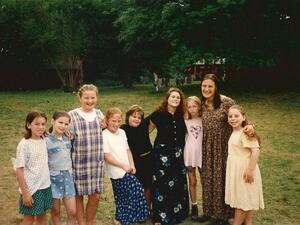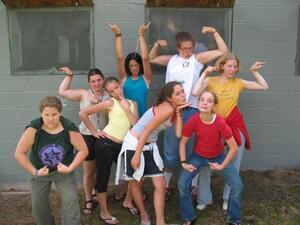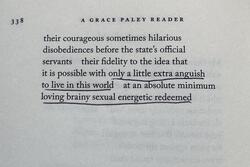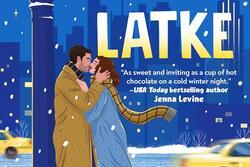My journey to love my legs and understand the Feminist movement
“How could you?!” Esther screamed.
“What? What are you talking about?” I asked.
“After everything you tell us about loving ourselves as we are and not letting society force hegemonic standards of beauty on our bodies, you went and shaved your legs! I don’t even know what to say to you!”
Here, on the edge of a small pond in southwestern Michigan, I had suddenly reached a turning point and I wasn’t prepared. For the first time, a student was questioning my personal practice as it related to my teaching. At the same time, perhaps unwittingly, Esther was asking me to confront a much larger issue I had managed to avoid for 19 glorious years: Am I a feminist? What does that even mean?
"I think that being a feminist means that you see the world whole instead of half,” Gloria Steinem says in the recent HBO documentary Gloria: In Her Own Words. When I heard her say that, I almost dropped my pizza in surprise. But as I chewed on her words, thought them over, I realized that I wholeheartedly agreed. Feminism is a movement, an ideology, a struggle. But behind the banners and the court cases and the icons of women’s lib, feminism simply describes a wholeness in our world, our communities, our families, and in ourselves.
I assumed I had learned everything I needed to know about feminism by my pre-teen years. I grew up thinking that feminism was something that already happened, that was immortalized in songs like Peter Alsop’s “It’s only a wee wee,” and practiced only by my hairy, smelly female summer camp counselors that would challenge me when they caught me shaving my legs in the communal showers. As I understood them, feminists were angry women who confronted the patriarchy in an off-putting, alienating, and angry way that had nothing to do with me or my life. As a young woman of 12 or 13, if there was one thing I knew I didn’t want to be, it was a feminist.
Fast forward six years to my first summer as a counselor at camp. After a particularly stressful week I had treated myself to a long shower, shaved my legs, and painted my toe nails. As I joined some of my campers just before our Shabbat celebrations began, one young woman turned to me with a look of astonishment and perhaps even betrayal on her face.
Hopefully I didn’t look as panicked as I felt. As Esther glared and my heart raced, I searched for something to say. My head swam with worry. Had my own shortcomings in feminist knowledge caused me to teach my campers the same stereotypes I had learned growing up? Was I the uncool, smelly counselor with the hot ideology but an unappealing bod? Or worse, was I just a hypocrite? I put my hands on her shoulders, mostly to steady myself.
In my own words, I explained to Esther what Gloria Steinem summed up at the end of the film when she is asked about young feminists today. "Kids have their own feminist heroes. I'm a different generation,” Steinem says. “The primary thing is not that they know who I am, but that they know who they are." Although I perhaps didn’t connect the dots until I sat down to write this article, my interaction with Esther and my own realizations about “being a feminist” were born from this same emphasis on self-knowledge and understanding on a broad scale.
Feminism is about observing the world we live in, and starting out, as Steinem says, “with the instinct of a little child who says ‘it’s not fair’ and ‘you are not the boss of me.’” But it doesn’t end there. It doesn’t end in anger over oppression or inequity. We build up our lives by doing things that make us happy and fulfilled, excited by the opportunities that are available to us. Most importantly, feminism means that we have the freedom and the desire to choose to live however we want—to shave our legs smooth or let our hair grow long and soft.
Gloria Steinem is featuerd in JWA's online exhibit Jewish Women and the Feminist Revolution.
Gloria: In Her Own Words is available on HBO On Demand through September 11, 2011 and on HBO GO until December 31, 2012.








I remember an aunt of mine, Living-in-Washington, DC-high society in 1969 - Jessica. She wouldn't let me sit at her breakfast table until I (at 16 years old) showed her my shaven limbs and (even!) axillae! I wonder what the omlettes tasted like...Right on, Sister! ... I mean, daughter!
Thanks for letting me in on the idea development... I like the way it came out in the end. Great piece!